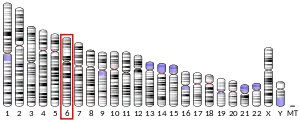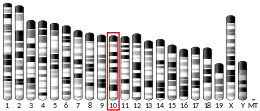| AIG1 | |||||||||||||||||||||||||||||||
|---|---|---|---|---|---|---|---|---|---|---|---|---|---|---|---|---|---|---|---|---|---|---|---|---|---|---|---|---|---|---|---|
| Identifiers | |||||||||||||||||||||||||||||||
| Aliases | AIG1, AIG-1, dJ95L4.1, androgen-induced 1, androgen induced 1 | ||||||||||||||||||||||||||||||
| External IDs | OMIM: 608514 MGI: 1913503 HomoloGene: 32297 GeneCards: AIG1 | ||||||||||||||||||||||||||||||
| |||||||||||||||||||||||||||||||
| |||||||||||||||||||||||||||||||
| |||||||||||||||||||||||||||||||
| |||||||||||||||||||||||||||||||
| Wikidata | |||||||||||||||||||||||||||||||
| |||||||||||||||||||||||||||||||
Androgen-induced protein 1 is a protein that in humans is encoded by the AIG1 gene.[5][6]
References
- 1 2 3 GRCh38: Ensembl release 89: ENSG00000146416 - Ensembl, May 2017
- 1 2 3 GRCm38: Ensembl release 89: ENSMUSG00000019806 - Ensembl, May 2017
- ↑ "Human PubMed Reference:". National Center for Biotechnology Information, U.S. National Library of Medicine.
- ↑ "Mouse PubMed Reference:". National Center for Biotechnology Information, U.S. National Library of Medicine.
- ↑ Seo J, Kim J, Kim M (Feb 2001). "Cloning of androgen-inducible gene 1 (AIG1) from human dermal papilla cells". Molecules and Cells. 11 (1): 35–40. PMID 11266118.
- ↑ "Entrez Gene: AIG1 androgen-induced 1".
External links
- Human AIG1 genome location and AIG1 gene details page in the UCSC Genome Browser.
Further reading
- Lai CH, Chou CY, Ch'ang LY, Liu CS, Lin W (May 2000). "Identification of novel human genes evolutionarily conserved in Caenorhabditis elegans by comparative proteomics". Genome Research. 10 (5): 703–13. doi:10.1101/gr.10.5.703. PMC 310876. PMID 10810093.
- Suzuki Y, Yoshitomo-Nakagawa K, Maruyama K, Suyama A, Sugano S (Oct 1997). "Construction and characterization of a full length-enriched and a 5'-end-enriched cDNA library". Gene. 200 (1–2): 149–56. doi:10.1016/S0378-1119(97)00411-3. PMID 9373149.
- Maruyama K, Sugano S (Jan 1994). "Oligo-capping: a simple method to replace the cap structure of eukaryotic mRNAs with oligoribonucleotides". Gene. 138 (1–2): 171–4. doi:10.1016/0378-1119(94)90802-8. PMID 8125298.
This article is issued from Wikipedia. The text is licensed under Creative Commons - Attribution - Sharealike. Additional terms may apply for the media files.



